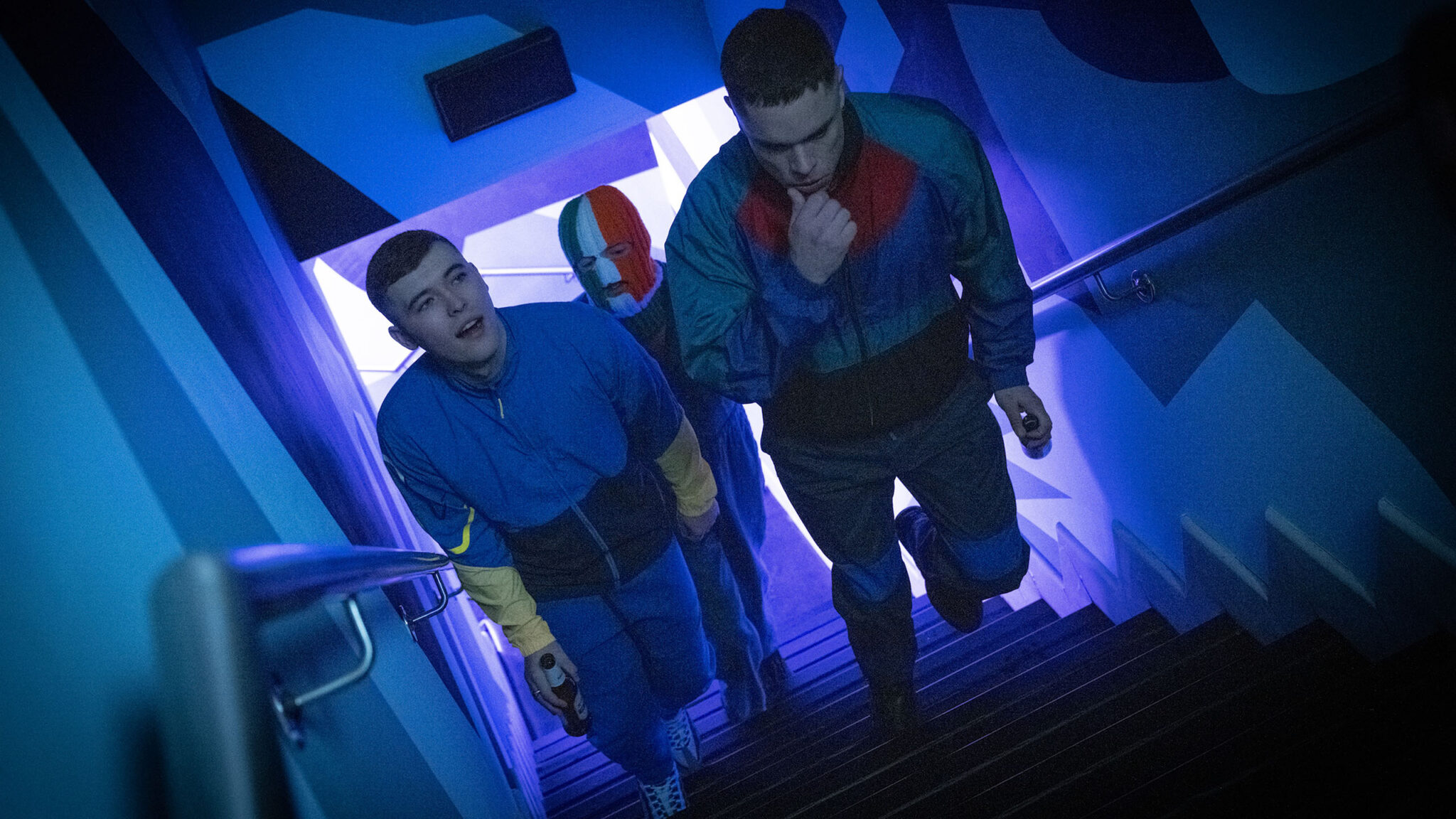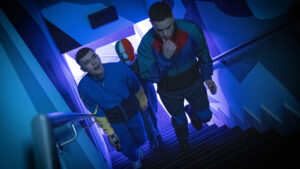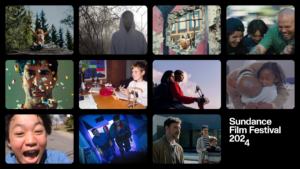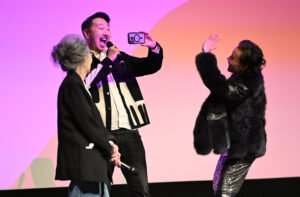By Lucy Spicer
One of the most exciting things about the Sundance Film Festival is having a front-row seat for the bright future of independent filmmaking. While we can learn a lot about the filmmakers from the 2024 Sundance Film Festival through the art that these storytellers share with us, there’s always more we can learn about them as people. This year, we decided to get to the bottom of those artistic wells with our ongoing series: Give Me the Backstory!
The director of Kneecap knows how to take his own advice. “Ignore the people who tell you, ‘That’s not how X and Y is done.’ Maybe that’s just not how it was done until you showed up,” says Rich Peppiatt, whose film about real-life Irish band Kneecap premiered at the 2024 Sundance Film Festival. Musicians — especially musicians with no acting experience — don’t typically play themselves in biopics, but Peppiatt took a chance. And the gamble was a big one. According to Peppiatt, the most challenging part of the whole project was “getting three musicians who’d never acted to a place where they could share scenes with the likes of Michael Fassbender and it not feel to audiences like they were only there because they’d won a raffle.”
But the gamble paid off, and the result is a frenetic, wild ride of a film that took home the Audience Award: NEXT at the Festival. Kneecap gives us the Belfast hip-hop group’s origin story, involving a chance meeting between teacher JJ Ó Dochartaigh and misfits Liam Óg Ó hAnnaidh and Naoise Ó Cairealláin that leads to the trio recording some high-energy tracks with unapologetically Irish lyrics destined to draw crowds of fans and critics alike.
Read on to learn more about Peppiatt, including how the director first got into filmmaking and what kind of audience he hopes to reach with Kneecap.
What was the biggest inspiration behind this film?
I think if you’re gonna make a film about a band, then that band better be your biggest inspiration for it, or it probably won’t be a very good film.
Describe who you want this film to reach.
From the get-go, the band were determined that any film should be made first and foremost for their own Gaeilgeoir (Irish language speaking) community in the North of Ireland. And I was fully behind that. I think when you do something that really focuses on the specific and authentic, sometimes, like magic, you can pop out on the other side with something universal.
Why does this story need to be told now?
Across the globe, a language dies every 40 days. We’re allowing our heritage and history as a species to just casually drain away.
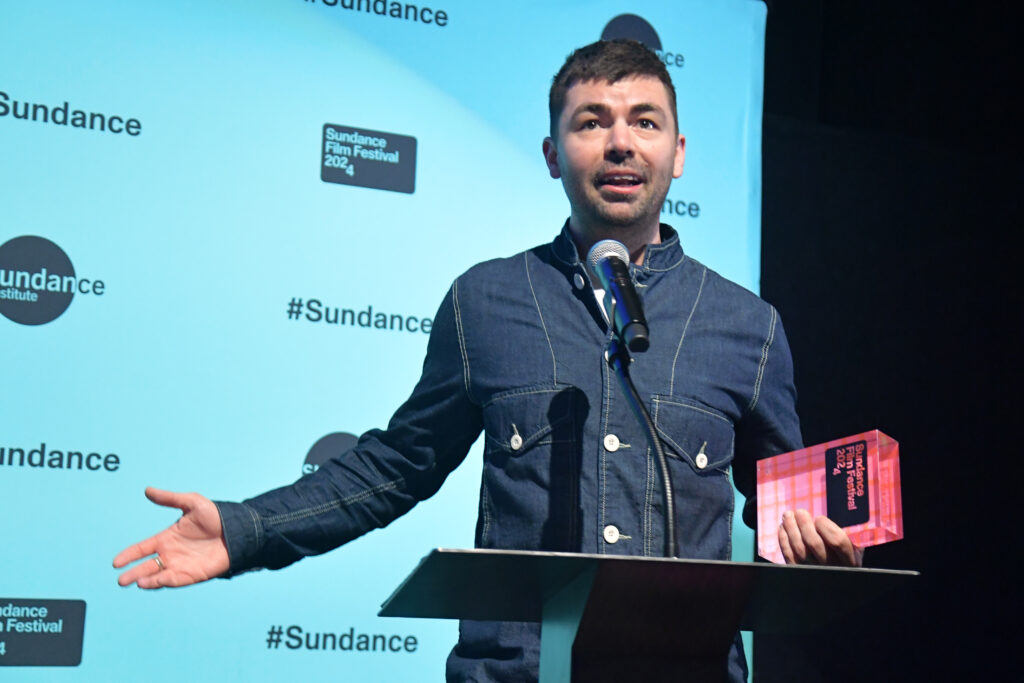
How do you want people to feel after they see your film?
Like going to a Kneecap gig immediately.
Tell us an anecdote about casting or working with your actors.
First morning of the shoot, myself and the band are standing around a big hole in the ground, the crew all watching on as we throw an imaginary ball to each other while shouting, “Zoff… Bang… Woosh.” It was one of our acting warmups, but I found out later everyone just thought we were maniacs.
Films are lasting artistic legacies; what do you want yours to say?
That we broke new ground in Irish language cinema.
Tell us why and how you got into filmmaking.
I’ve been interested in writing since childhood, but directing didn’t really interest me until my mid-20s, after I got the opportunity to turn a stand-up comedy show I’d created into a documentary. After that, I was all in.
Why is filmmaking important to you? Why is it important to the world?
Filmmaking is important to me because it gives me purpose. You live the film you are making, and I find great pleasure in that full immersion. I have difficulty with the concept that filmmaking is important to the world, because by proxy I’m claiming I am important to the world, and I don’t think I am.
If you weren’t a filmmaker, what would you be doing?
A chef. My kitchen is my happy place.
What three things do you always have in your refrigerator?
Hot sauce (although people tell me I shouldn’t keep that in the fridge — sorry), butter, and beer. My wife has a phobia of running out of butter so we always have about 5 blocks. Meanwhile, I have a phobia of really wanting a beer and having no beers.
Early bird or night owl?
Early bird
Who was the first person you told when you learned you got into the Sundance Film Festival?
Kneecap’s script editor, Danny Wigley. I know that seems random, but Danny and I have been writing scripts since university; we feel each other’s victories and defeats (usually defeats) as if our own.
What’s your favorite film that has come from the Sundance Institute or Festival?
The Usual Suspects




